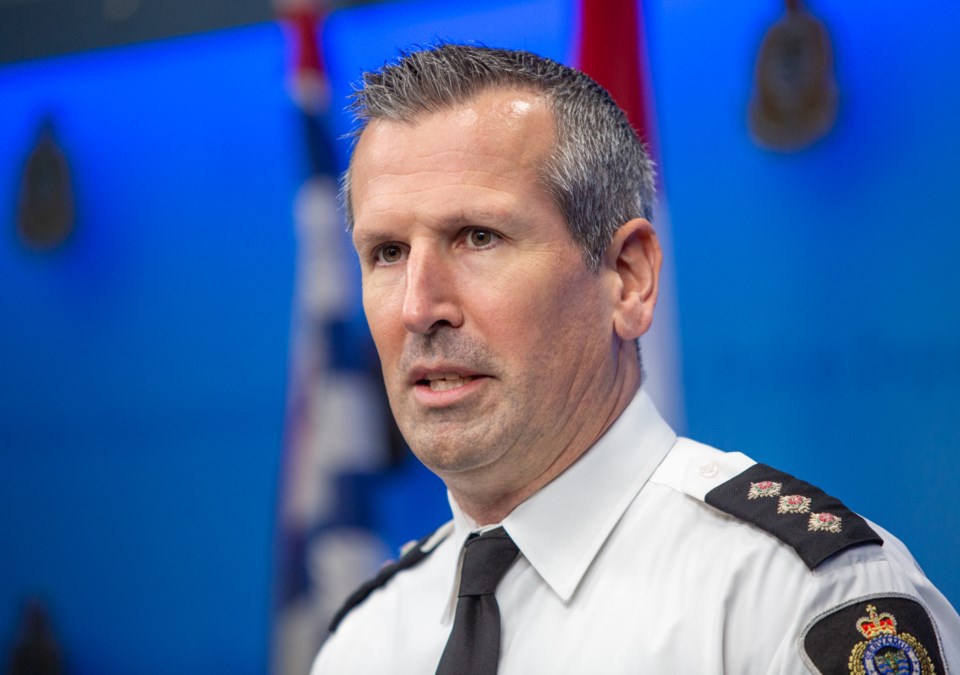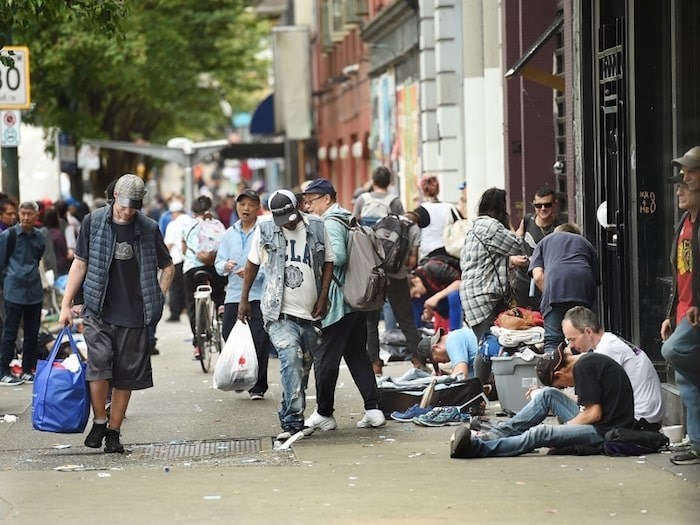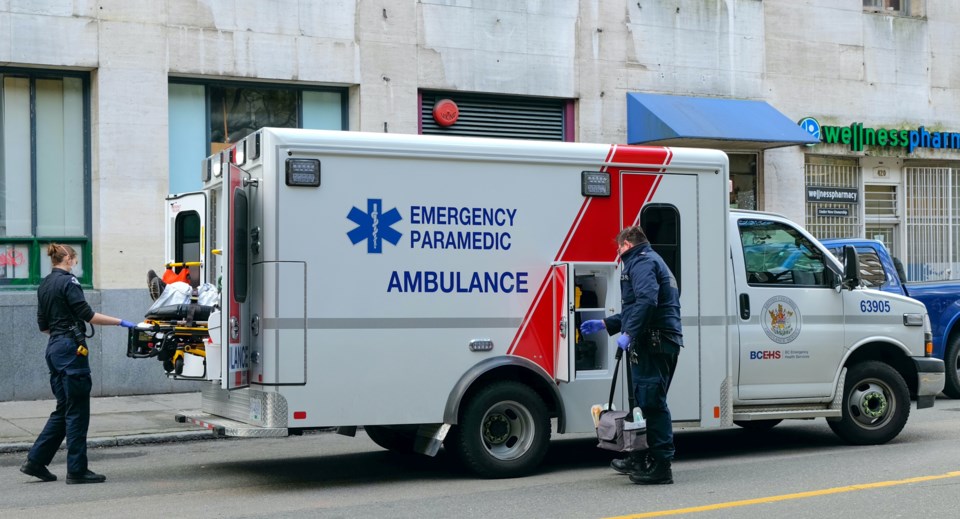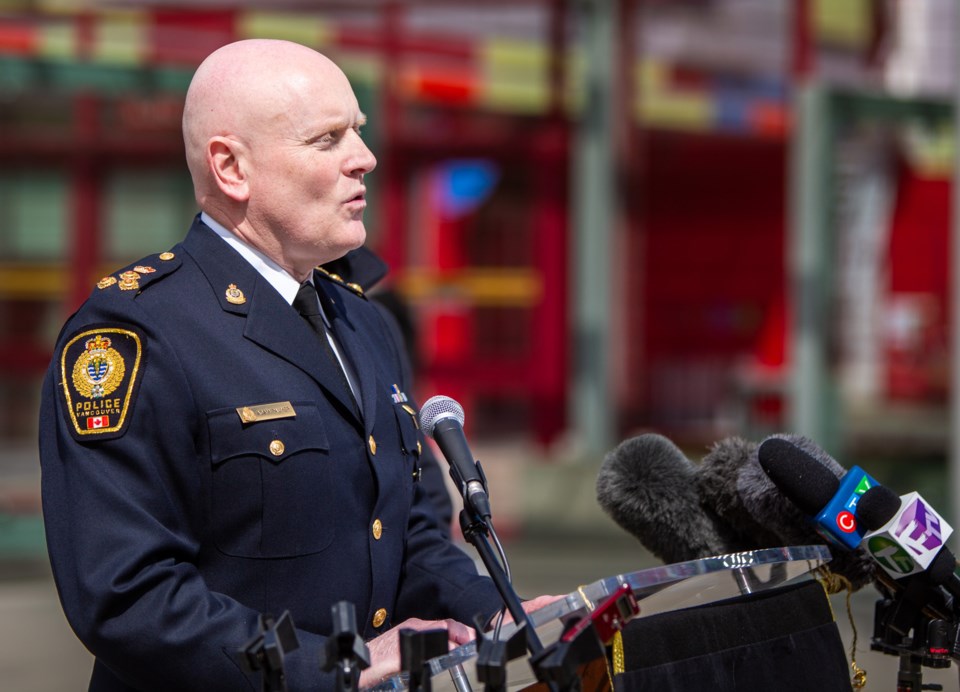Vancouver Police Chief Adam Palmer says public drug use has amounted to an “intolerable situation” across the city and welcomes the provincial government’s move to amend B.C.’s decriminalization experiment.
Premier David Eby announced April 26 that his government is working with the federal government to return power to police to enforce against drug use in all public places, including hospitals, restaurants, transit, parks and beaches.
“It’s going to give us all the tools basically that we had before, which is going to be super helpful,” said Palmer of the pending changes, which still need to be approved by the federal government.
Under B.C.’s decriminalization experiment, which was approved via a Health Canada exemption, people in possession of 2.5 grams or less of fentanyl, heroin, morphine, crack and powder cocaine, methamphetamine or MDMA could not be arrested or have their drugs seized.
Palmer said the experiment, which began Jan. 31, 2023, has allowed for people to use drugs in places where police would normally intervene. Prior to the new law, police could tell the drug user to move along, redirect them to an overdose prevention site or arrest them.
“You're getting people that are out with their families at the beach, and you've got somebody sitting right next to them smoking meth, or somebody's smoking crack — and there was nothing that police could do about it,” the chief said.
He added: “It's an intolerable situation. You've got open drug use on the sidewalks in different neighbourhoods, in Yaletown and Coal Harbour — all over the city. We're not just talking about the Downtown Eastside.”
At the same time, Palmer's department has reported a decrease in arrests and public complaints related to drugs.
In March, the VPD released data that showed “a dramatic drop-off” in small drug seizures since the decriminalization trial began last year.

Decrease in public complaints
A March 26 news release said officers did not make any drug possession seizures below 2.5 grams during the first nine months of the trial.
In addition, all drug possession seizures, regardless of weight, decreased 76 per cent during the first nine months of the trial, compared to the previous four-year average.
“We support a caring and compassionate approach to solving the toxic drug crisis,” said Insp. Phil Heard, who oversees the VPD’s drug unit.
“We don’t support putting people in jail simply because they use drugs or struggle with substance-use disorder. We believe that the decriminalization pilot is an important part of a larger strategy that is required to respond to the ongoing crisis.”
In a press conference after the VPD issued the news release, Heard told reporters that decriminalization had not led to an increase in complaints from residents about public drug use.
“We've actually seen a decrease in public complaints around public consumption,” he said. “But that doesn't mean that circumstances don't arise where people rightfully have concerns around public drug use, and we're still responsive to that.”
Those circumstances were what Palmer referred to in his interview Tuesday with Glacier Media.
“You should talk to the businesses downtown, and the issues that they're seeing in different places with open drug use, and how it's bad for their business,” the chief said. “People don't want to come in [to the businesses] and they got people blocking the way in. There's all kinds of stuff going on all over the city.”
Palmer said the VPD has not kept statistics on number of incidents where a person was using drugs in a public place, where police were unable to intervene. There was no reason to, he said, because the incidents were not considered illegal.

'High volume of drug use'
Asked how the government’s move to recriminalize drugs will affect policing in the Downtown Eastside, where public drug use has been observable for decades, the chief said police will continue to be “practical” about enforcement and priorities.
“There is such a high volume of drug use in the Downtown Eastside,” he said. “It's not realistic to think at any time in our history when we had enough police officers to deal with everybody that does drugs openly in the Downtown Eastside — unless you want to hire a thousand more officers.”
Palmer said his department’s focus will continue to be on drug traffickers and manufacturers.
“Our focus is not all of a sudden going to be on people possessing drugs — that's never been a focus for us,” he said. “And quite frankly, Crown counsel doesn't want to take charges for small amounts of possession anywhere in Canada.”
One of Palmer’s deputy chiefs, Fiona Wilson, told the House of Commons standing committee on health April 15 that police don’t support the notion of “trying to arrest ourselves out of this crisis.”
“That is not going to save lives,” said Wilson, who is president of the B.C. Association of Chiefs of Police.
“In fact, it does quite a bit of harm if it's somebody with a significant addiction that they need medical help with, or somebody who needs support. The last thing they need is to be introduced into the criminal justice system.”
More than 14,000 people in B.C. have died of a drug overdose since a public health emergency was declared in April 2016. Most recent data from the BC Coroners Service shows 177 people died in the province in February.
Police have said there is no evidence that decriminalization has had an effect in reducing the death toll.

'Unworthy of saving'
The provincial government’s move to amend the Health Canada exemption has been widely criticized by drug user advocacy groups, including the Harm Reduction Nurses Association (HRNA).
Corey Ranger of the HRNA said in an April 26 news release that the government’s move will put people who use drugs and people who rely on public space at further risk of harm and death.
BC Coroners Service data shows the majority of people who have died of an overdose in the province over the past decade have been found alone and inside a residence, or building.
“We all want and deserve communities where all people, whether they use drugs or not, can access safety and well-being,” Ranger said.
“By imposing these restrictions on the decriminalization pilot without offering real solutions like expanding overdose prevention services and access to housing, the province has declared some lives unworthy of saving.”
The B.C. government says since 2017 it has opened 600 publicly funded substance use treatment beds in the province. A total of 50 overdose prevention sites operate around the province, including 24 with drug inhalation services.
The government says it has also invested $35 million since 2019 to support 49 community counselling agencies, and more than 250,000 free or low-cost counselling sessions have been delivered to individuals, couples and families.



